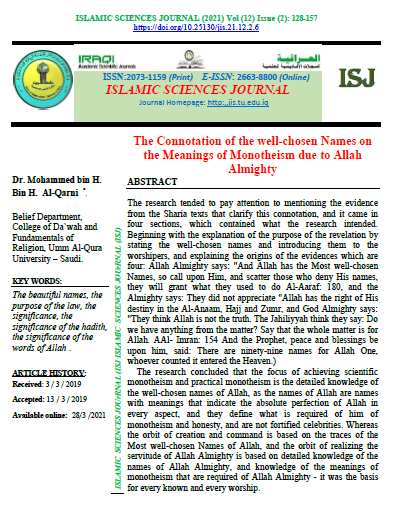The Connotation of the well-chosen Names on the Meanings of Monotheism due to Allah Almighty
Main Article Content
Abstract
The research tended to pay attention to mentioning the evidence from the Sharia texts that clarify this connotation, and it came in four sections, which contained what the research intended. Beginning with the explanation of the purpose of the revelation by stating the well-chosen names and introducing them to the worshipers, and explaining the origins of the evidences which are four: Allah Almighty says: "And Allah has the Most well-chosen Names, so call upon Him, and scatter those who deny His names, they will grant what they used to do Al-Aaraf: 180, and the Almighty says: They did not appreciate "Allah has the right of His destiny in the Al-Anaam, Hajj and Zumr, and God Almighty says: "They think Allah is not the truth. The Jahiliyyah think they say: Do we have anything from the matter? Say that the whole matter is for Allah. AAl- Imran: 154 And the Prophet, peace and blessings be upon him, said: There are ninety-nine names for Allah One, whoever counted it entered the Heaven.)
The research concluded that the focus of achieving scientific monotheism and practical monotheism is the detailed knowledge of the well-chosen names of Allah, as the names of Allah are names with meanings that indicate the absolute perfection of Allah in every aspect, and they define what is required of him of monotheism and honesty, and are not fortified celebrities. Whereas the orbit of creation and command is based on the traces of the Most well-chosen Names of Allah, and the orbit of realizing the servitude of Allah Almighty is based on detailed knowledge of the names of Allah Almighty, and knowledge of the meanings of monotheism that are required of Allah Almighty - it was the basis for every known and every worship.
Article Details

This work is licensed under a Creative Commons Attribution 4.0 International License.
COLLEGE OF ISLAMIC SCIENCES, TIKRIT UNIVERSITY. THIS IS AN OPEN ACCESS ARTICLE UNDER THE CC BY LICENSE http://creativecommons.org/licenses/by/4.0/

